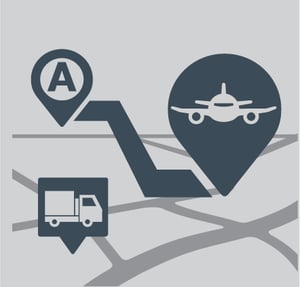For shippers, the past two years have been a roller coaster ride. As quickly as capacity became limited and freight rates increased in 2018, the opposite occurred in 2019. Carriers that had invested in equipment and drivers in 2018 saw excess capacity and plummeting rates in 2019, a year with a record number of trucking company bankruptcies. It was a dramatic shift that occurred much faster than typical cyclical changes in the transportation industry.
Where do we go from here as trucking companies continue to adapt to new regulatory changes, uncertainty about fuel prices and increased operational costs due to an almost doubling of insurance rates?
Here are four ways for shippers to manage in this environment and whatever the “new normal” becomes.

Four Ways to Navigate 2020
1. Drive efficiency throughout the entire supply chainIn order to better prepare for potential trucking capacity challenges, shippers should look at ways to drive efficiency throughout their supply chains, holistically. It is about making the most of available capacity and achieving cost savings across the board. Those efficiencies can help offset any one area of price increases, like carrier pricing. Data and analytics are critical to achieving, maintaining and measuring supply chain performance as well as one element of the supply chain – transportation.
2. Use data effectively

Today, there are mass amounts of data collected by shippers. The next step is being able to analyze the data and make it actionable. In the year to come and beyond, the transportation industry will have more access to data and information than ever before, allowing shippers to react much faster to complications and areas that require improvement. Through the utilization of data as a troubleshooting tool, changes occur much faster in the industry as they are identified sooner.
Getting data not only within your network but having access to data sources that represent the broader marketplace is crucial to truly understand what's happening in the market and the impact. Using the data for predictive analytics will help shippers by allowing them to not just look back on historical data and be reactive but look forward to more accurately predict what's to come and how to get ahead.
3. Connect internal functions to avoid operating in silos
Disconnects in the supply chain can lead to a domino effect of issues. For example, if there is no real-time communication between warehousing operations and transportation, carriers may be waiting at dock doors for freight that is not ready on time.

The cause may be an area of inefficiency in the warehouse, such as lack of staffing, but the results will impact both parties. The warehouse experiences reduced productivity and having too much inventory on hand. And for carriers, long waits at a customer’s dock disrupt their entire route and on-time performance for the day. By operating seamlessly rather than in silos, the entire supply chain is more efficient – using the capacity that is needed and being a preferred shipper by not delaying carriers with excessive detention times.
4. Expand reach by outsourcingIncreasingly, companies are looking to 3PL partners to expand their reach. Not only will the shipper have additional resources to manage supply chain functions, but for shippers looking specifically for help with transportation, some 3PLs provide clients with to access to capacity, relationships with thousands of carriers and visibility into market rates. Shippers can leverage the 3PL’s investment in technology and logistics engineering to ensure supply chains are operating at optimal levels, regardless of the rapidly changing dynamics in the freight industry.


